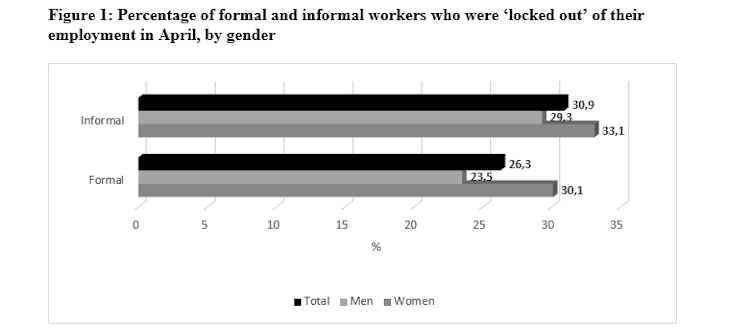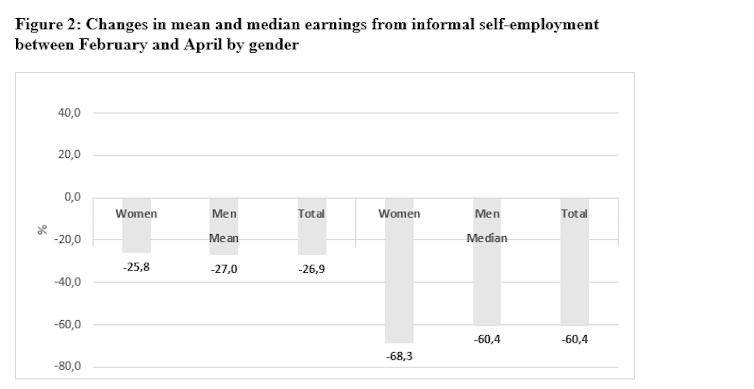Support for women informal workers is urgent as pandemic unfolds in South Africa
Early in the COVID-19 pandemic, the International Labour Organisation predicted that measures to curb the spread of the disease would disproportionately affect women workers. This has certainly turned out to be true in South Africa.
Recent data suggest that under the strict lockdown conditions imposed in April, two-thirds of the 3 million people who lost their jobs were women. For the formally employed, schemes were put in place that offered some protection. But for the roughly one-third of the workforce in the informal economy, there is no safety net.
Our research, using data from the National Income Dynamics Study – Coronavirus Rapid Mobile Survey, shows that the informal economy suffered a major shock during the April lockdown period when no one, other than essential service workers, could leave their homes other than to access food, medicine, and social grants. It shows that women informal workers were particularly negatively affected.
Negative impacts
The informal economy is a broad term which includes wage employment (domestic workers, taxi drivers, security guards) and the self-employed (street traders, waste recylers, educare providers, backyard mechanics).
Of those who did not lose their jobs completely, the data suggest that many informal workers were not able to work in April. About 31% of informal workers reported that they were locked out of their employment, compared with 26% of those in formal employment. Women in both formal and informal employment were more likely to be locked out than their male counterparts.

Women in the informal economy, and particularly those in informal self-employment, recorded large cuts in working hours and earnings.
For the typical informal worker, working hours decreased from the standard 40-hour week in February to only 20 hours per week in April. At the median, women in informal employment experienced a 49% reduction in working hours between February and April (from 35 to 18 hours) while men saw a 25% decrease over the same period (from 40 to 30 hours).
Earnings losses between February and April for the typical informal self-employed worker were substantial. At the middle of the earnings distribution, earnings were 60% lower for the self-employed in April compared with February, while women’s typical earnings from informal self-employment were nearly 70% lower.
Moreover, the data suggest that the largest differences in earnings between February and April were concentrated among the most vulnerable workers with the lowest earnings. Even before this crisis, women working informally recorded substantially lower incomes than men.

Why it matters
Income losses of this magnitude are a particular cause for alarm given the links between the loss of informal sources of income and the risk of dramatic increases in extreme poverty, hunger and food insecurity. Just under half of informal workers reported that their household had lost its main source of income since lockdown began. Over half reported that their household ran out of food during April.
If the analysis is restricted to workers who were ‘locked out’ of employment in April, then an alarming 60% of informal workers reported a shortfall in income that left them unable to meet their food needs.
In line with other work that highlights the risk of mass hunger, these findings suggest that, as the pandemic unfolds in South Africa, current interventions need to be significantly scaled up and far better targeted at informal workers in general, and women informal workers in particular.
Some solutions
A multi-faceted support package, informed by the gendered nature of work, needs to be implemented as a matter of urgency. Key tenets should include:
Firstly, increases to the child support grant should be per child not per caregiver: This measure alone would result in one-third more support to the poorest people, and an additional 2 million people above the food poverty line. Most child grant recipients are women and two-thirds of informal workers live in a household that receives one.
Second, the amounts allocated in the social grants should be increased. World Bank analysis of cash transfers introduced in over 200 countries during the pandemic calculates that the amounts are on average 30% of monthly GDP per capita. South Africa’s increases of R250 and R500 are between 3.5% and 6.9% of monthly GDP per capita. These amounts do not cover the monthly cost of a basic nutritious diet for one child of R638, let alone the R3,413 needed for a household. Increases need to be extended beyond the current October cut off.
Third, use the special COVID-19 grant as the basis of a universal basic income guarantee.
The introduction of a universal basic income guarantee would strengthen informal worker livelihoods. Two-thirds of the 2.7 million recipients of the government’s special COVID-19 grant, which should have reached at least 1.7 million more by the end of June, were men. This is one example of the systemic exclusion of women as well as the pitfalls of a non-universal system.
Fourth, rapidly scale up the provision of food parcels. Department of Social Development data shows that food parcels have only reached 12% of those who needed them. With an estimated one in every two South Africans suffering food insecurity, food parcel provision needs to be radically upscaled, and – working alongside informal worker organisations – better targeted to reach informal workers in general and women informal workers in particular.
Fifth, reform the unemployment insurance system. Despite legislation compelling employers to register all workers, registration rates among certain worker groups remain extremely low. By mid June only 35,374 of the 1.2 million domestic workers had received unemployment benefits. Without a concerted effort from the department, informal workers will remain excluded.
Sixth, revise the requirements to access small business support. To qualify for loans and grants, applicants must satisfy multiple registration requirements. This places serious bureaucratic burdens on informal operators and might simply exclude them.
In addition, far greater attention needs to be paid to how different worker groups within the informal economy can operate in ways that minimise health risks. The policy response must help informal workers avoid the Hobson’s choice between earning a living and keeping themselves safe during the pandemic.
The authors are part of the global research-advocacy network Women in Informal Employment: Globalizing and Organizing.![]()
Mike Rogan, Associate professor, Rhodes University and Caroline Skinner, Senior researcher at the African Centre for Cities, University of Cape Town
This article is republished from The Conversation under a Creative Commons license. Read the original article.
Written by: Zuko
Similar posts
MORE ARTICLES

‘We said yes to forever’ – Miss SA Mia le Roux announces engagement

SA Powerball Results for tonight: Tuesday, 08 July 2025

‘I’m not happy with my husband helping his ex find a job’ – The Blind Spot

‘The Queenstown Kings’ star Tessa Twala launches podcast for professionals in the entertainment space

Why is electricity so expensive? Energy expert breaks it down
QUICK LINKS
UpComing Shows

The Best T in the City
With T Bose
He has held it down in the world of mid-morning radio with the best music, riveting topics, brilliant mixes and interesting guests. Every weekday, The Best T proves why he is the BEST by connecting to you like only your bro or favourite uncle could. He lets his listeners dictate the songs they want to hear in the ever-popular Top 10 at 10, and his Three Teaspoons never run out. Catch The Best T in the City Mondays to Fridays from 09h00 to 12h00.
close
Feel Good
With Andy Maqondwana
Feel good about feeling good! That's exactly what The Feel-Good show is about. An escape from the negativity that surrounds us, indulging you in good feels. Pass it on to one and all. Spread the good feeling around Gauteng with Andy Maqondwana.
close
Kaya Biz
With Gugulethu Mfuphi
The world of business is simplified for you by Kaya Biz with Gugulethu Mfuphi. This fast-paced award-winning business show talks to the corporate giants as well as up and coming entrepreneurs about their wins and challenges. Gugulethu invites guests to offer their analyses of markets and economies, and also delves into issues of personal financial wellness. Kaya Biz airs Mondays to Thursdays 18h00 to 19h00.
close
Point of View
With Phemelo Motene
Point of View with Phemelo Motene delves into the day’s current affairs, touches on real issues that affect people’s daily lives and shares expert advice on questions posed by the audience. Mondays to Thursdays 20:00 to 22:00.
close
959 Music Weekdays
Kaya 959 Hits
Real. Familiar. Memorable. Kaya 959 brings you the music you know and love from our playlist. Uninterrupted. Thursdays 20h00 to 21h00
closeConnect with Kaya 959
DownLoad Our Mobile App
© 2025 Kaya 959 | On The Street On The Air










